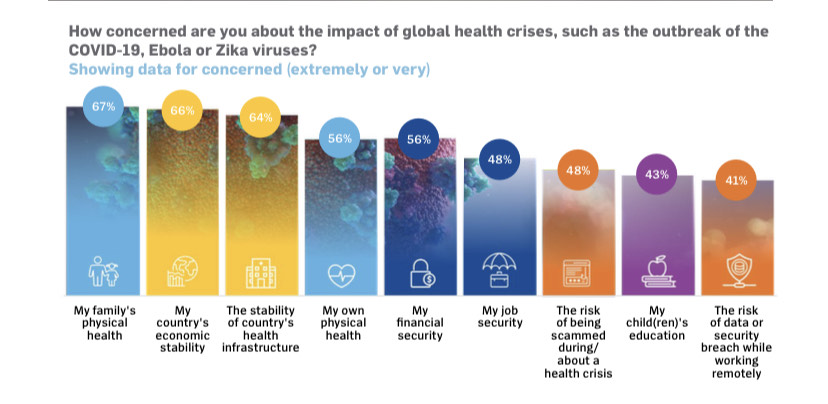Filipinos ‘most concerned’ about security, study says
Security, be it financial, online, personal or national, is a big issue to Filipinos—so much so that the Philippines remains the most worried about such problems compared to other countries, says a recent study.
According to the 2020 Unisys Security Index, the Philippines reclaims the title of “most concerned country” about security compared to 14 others, according to the annual study conducted between March 16 and April 5, at the height of the COVID-19 pandemic.
Based on national surveys of over 15,000 respondents ages 18 to 64, the index measures consumer attitudes toward eight areas of security in four categories: national security (in relation to war or terrorism, and natural disasters or an epidemic); financial security (bankcard fraud and financial obligations); internet security (viruses/hacking and online transactions); and personal security (identity theft and personal safety).
Comparing this year’s index to last year’s, results show that the Philippines’ score (238) went up by four points. The survey ranks concerns from zero to 300; 100 is “somewhat concerned,” 200, “very concerned”; and 300, “seriously concerned.”
Next to the Philippines is India (223), a new addition to the index; then Chile (223), Colombia (218), and Mexico (217).
Breaking down results by category, the Philippines is still the most concerned about personal security (index score 251). Asked specifically what concerns them about the impact of a global health crisis, such as COVID-19, Filipinos—along with respondents from India, Singapore, Belgium, France, the Netherlands, Chile, Colombia, and Mexico—chose their family’s physical health as their No. 1 worry.
Article continues after this advertisementOverall, more respondents said they were “seriously concerned” about personal safety (58 percent, an increase of nine percentage points compared to last year’s results) and natural disasters (62 percent, increase of eight percentage points). On the other hand, while many still worry about internet security, concern about this category (which includes identity theft, bankcard fraud, hacking and viruses, and online fraud) have notably decreased, despite people’s increased reliance on online activities/tools/solutions.
In relation to the pandemic, only 48 percent of respondents globally are concerned about “the risk of being scammed during/about a health crisis”; even lower, at 41 percent, are those worried about “the risk of data or security breach while working remotely.”
“This reflects a false sense of security, given the risks are now higher, in light of COVID-19, than ever before,” the report reads.
The study does note, however, that when compared to other countries, the Philippines remains the most concerned, too, about internet security (index score 228).
But while concern over online security has fallen this year, the Unisys report says that consumers are “clear” about whom they would be willing to share personal data with. There isn’t too much worry when data are being used for emergency assistance or security alerts, and public sector usage (police or government agencies) is deemed “more acceptable” than usage by private businesses, the report says.
Understandably, personal safety, especially when about one’s health, trumps all other concerns now that the world is still gripped by the pandemic. However, Unisys notes that consumers may be turning a “blind eye” to long-term financial and internet risks, such as identity theft phishing scams, bankcard fraud, and the security of online shopping.
“It’s a consequence of people being so focused on health and personal safety,” says Ashwin Pal, Unisys cybersecurity director for Asia Pacific. “It’s distracted them from internet and financial security, which is why they’ve weighted those concerns lower. And frankly, that’s one of the things that scammers count on when launching phishing attacks. They hope they can fly into the right app because people are too worried about their health.” —Annelle Tayao-Juego
